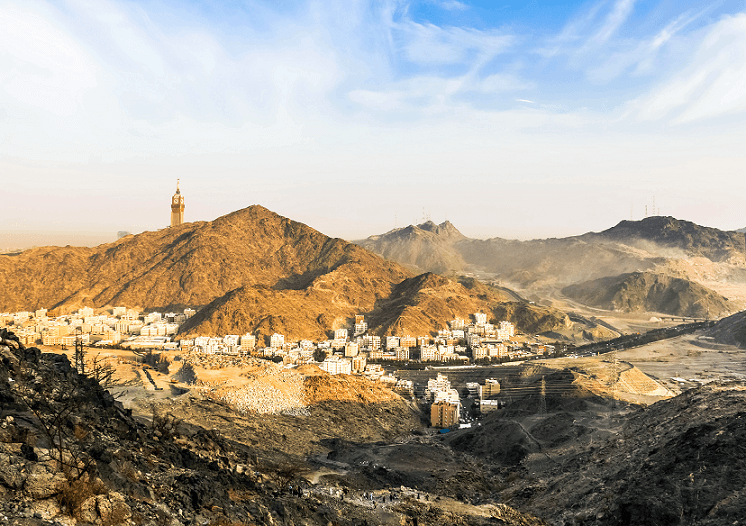وَكَذَٰلِكَ أَوْحَيْنَآ إِلَيْكَ رُوحًۭا مِّنْ أَمْرِنَا ۚ مَا كُنتَ تَدْرِى مَا ٱلْكِتَـٰبُ وَلَا ٱلْإِيمَـٰنُ وَلَـٰكِن جَعَلْنَـٰهُ نُورًۭا نَّهْدِى بِهِۦ مَن نَّشَآءُ مِنْ عِبَادِنَا ۚ وَإِنَّكَ لَتَهْدِىٓ إِلَىٰ صِرَٰطٍۢ مُّسْتَقِيمٍۢ
“And so We have sent to you ˹O Prophet˺ a revelation by Our command. You did not know of ˹this˺ Book and faith ˹before˺. But We have made it a light, by which We guide whoever We will of Our servants. And you are truly leading ˹all˺ to the Straight Path.” (42:52)
After Jibreel (AS) first appeared before Muhammad (SAW) at the cave of Hira, a long time passed without any further revelation. A distressed Muhammad (SAW) feared Allah (SWT) had abandoned him. But then he would sense Jibreel’s (AS) presence and become calm again. This interim period was a time of contemplation, a time for Muhammad (SAW) to prepare himself for what lay ahead.
One day Muhammad (SAW) returned to the cave of Hira to worship in solitude. As he left the cave and began to descend the mountain, another strange event took place. It was at this time that the Prophet (SAW) received the second revelation. It comprised of the first five verses of Surah AI- Muddaththir:
“O you wrapped in garments! Arise and warn! Magnify your Lord, and your clothing purify! Shun idols and false worship!” (74: 1-5)
Muhammad (SAW) accepted his duties as prophet and messenger with resolute obedience. He answered his Lord’s call by inviting members of his household to worship Allah in keeping with His commandments. The Prophet (SAW) began to quietly teach those closest to him, those whose hearts he felt would be open to the truth.
The Earliest believers
Khadeejah (RA) was the first person to believe her husband had been chosen as Allah’s Messenger and Prophet. As his wife, she knew more than anyone else did that Muhammad (SAW) was no ordinary man: his sublime character and innate morality set him apart from those he lived among. She had heard talks about AlJah’s final prophet who was yet to appear. She had also heard about some of the strange and miraculous events that others had witnessed concerning Muhammad (SAW). Furthermore, she had heard Waraqa say that the Angel who had come to the cave of Hira was none other than Jibreel (AS), and that this angel had brought Muhammad (SAW) a revelation from Allah (SWT). Lastly, she was present now Surah Al-Muddaththir was revealed. It was therefore only natural that she was the first to believe in Muhammad (SAW) and his appointment as Allah’s final messenger.
Abu Bakr (RA) was also among the first people to become Muslim. When the verses of Surah Al-Muddaththir were revealed, the Prophet (SAW) went to Abu Bakr (RA), who was a leading Makkan trader and a prominent figure in his own right and told him what had happened. Two years younger than the Prophet (SAW), he was thoroughly familiar with his friend’s character and the reputation he enjoyed in the community for truthfulness. Abu Bakr did not doubt Muhammad’s (SAW) declaration of his prophethood, just as he did not refuse his invitation to Islam. With his declaration of faith, he became one of the first Muslims.
Ali bin Abu Talib (RA) was only a child when the Prophet’s (SAW) mission began, and some sources indicate that he was ten years old when he became Muslim. He was living under the Prophet’s (SAW) guardianship since his father, Abu Talib, was unable to provide for all his children. Muhammad (SAW) was like a second father to the boy, who believed without a doubt that his guardian was indeed a prophet, and that he had brought the truth.
Among the first to accept the faith was also the Prophet’s freedman, Zayd bin Harith bin Sharahbeel Kalbi. Sold into slavery in the pre-Islamic era, Zayd had refused to leave the Prophet (SAW) when his relatives tried to buy his freedom. For a while he was known as Zayd bin Muhammad, but following the prohibition of giving adopted children the names of their foster parents, he was referred to by his actual name as mentioned above. Notwithstanding the change of name, Zayd’s love for the Prophet was deep and the bond between the two was enduring.
The Prophet (SAW) started calling people to Islām and many people including ꜤUthmān ibn ꜤAffān, Zubayr ibn Awwām, ꜤAbdul Raḥmān ibn Awf, Ṭalḥa ibn ꜤUbaydullāh and SaꜤad ibn Abi Waqqāṣ (RA) all accepted Islām on his hands.
As more people embraced, they started to use the house of Arqam (RA) to congregate. Arqam (RA) was either the 7th or 10th person to enter the fold Islām. The Muslims would continue to gather here until Islām was strengthened with the reversion of ꜤUmar (RA). After he became Muslim, they would gather wherever they wanted. According to some sources the location of Arqam (RA) house was at the foot of Mount As-Ṣafā.
(When the Moon Split: A biography of Prophet Muhammad (SAW) by Safiur-Rahman Al-Mubarakpuri)
(Sirah of Muhammad (SAW), Part 4- The Early Years of Prophethood by Maulana Ebrahim Noor)
